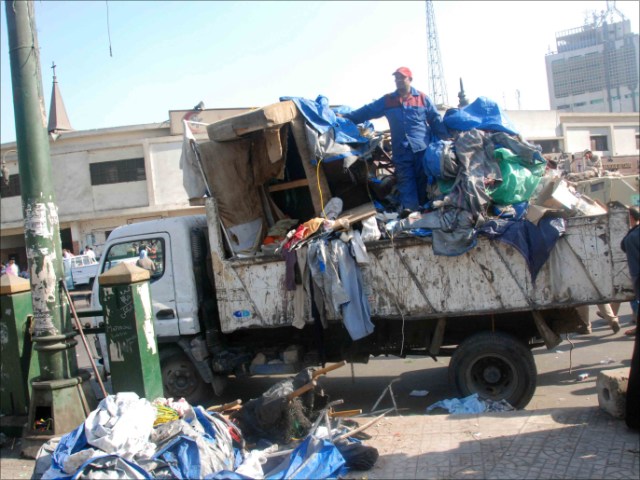Despite the outbreak of the Corona epidemic and the growing fears of Egyptians about infection, it seems that the Egyptian citizen is not indifferent to all this, as he goes daily to collect garbage for 20 pounds, which he receives every month from every house he serves (the dollar is about 16.17 pounds).
Syed does not care about gags and other precautions, as it is more important for him and his circumstances to obtain sustenance in his day.
Syed says to Al Jazeera Net that there is no government agency that takes care of the interests of garbage collection workers and gives them masks or other protective tools, so he has to buy them from his little money, but he only wears them while walking on public roads, in anticipation of his being subject to the penalty imposed by the authority on whom Do not use the muzzle.
Garbage collectors work with bare hands in collecting waste, whether from homes or streets, where paper napkins, masks, and medical gloves are lying on the street, but there are also those who are known as “garbage dumpers” who go to garbage bins and collecting areas in general and sort them and choose specific materials that they can sell For workshops and recycling plants, such as cardboard, plastic and metal.
Statistics of the Ministry of Environment indicate that Egypt annually produces about 90 million tons of solid waste, at 55,000 tons per day, including about 20 million tons of municipal waste, "garbage", and that about 47% of the amount of municipal waste is generated from 4 governorates are: Cairo , Giza, Qalyubia and Alexandria.
The number of workers in the official garbage in Egypt is estimated at about 3 million cleaning workers registered in the Garbage Collectors Syndicate, of whom about one million cleaning workers are affiliated with the private sector, and the cleaning companies occupy them with various interests and authorities, according to the head of the Garbage Collectors Union Shehata al-Maqdis.
About one million garbage workers work in the Public Authority for Cleaning and Beautification of the Ministry of Local Development, and work in sweeping streets and afforesting public parks.
Infection allowance
With the increasing rates of infection with the Corona virus, a member of the Union of Public Authority for Hygiene, Hussein Al-Abyad, asks, "Why does not the state spend the employees of the cleaning authority instead of an infection similar to doctors, especially since they always work in the field and in the line of fire in front of Corona?"
In his interview with Al-Jazeera Net, Al-Abyad says that the Cairo Cleaning and Beautification Workers Syndicate had in April sent a request for accreditation and provision of masks, and exchange an infection allowance for workers in the field, similar to service organizations working in public service areas, but they did not They find a satisfactory response, as the response came that the possibility of providing financial credit will be discussed.
In turn, the sanitation worker Mohamed says, "Unfortunately, we are marginalized and there is no view of officials for the most basic of our rights, in light of the negative stereotypical view of the cleaners. We are the most vulnerable to infection with viruses due to the nature of dealing with waste and garbage."
Speaking to Al-Jazeera Net, Mohamed pointed out that many garbage collectors were infected with viruses such as "C and swine flu" during the past years during the spread of these viruses.
Scary results
For his part, the head of the garbage collector, Shehata Al-Maqdis, said, "Since the beginning of the crisis, we have knocked on the government's door to demand means of preventing corona virus, especially with the difficult situation due to the fact that many citizens are not accustomed to throwing medical waste like masks and others in separate bags."
Speaking to Al-Jazeera Net, Shehata adds, "The burden of disposing of hazardous waste falls throughout the Republic, which makes us among the most vulnerable to infection after doctors. However, there is no clear interest which makes the idea of infection for garbage collectors scary for its cumulative effects on them and their families, Especially because they live in random areas like Zarayeb in the Nasser facility in Cairo. "
He explained that despite the state's appeal to provide support by providing special masks, gloves and plastic shoes for all garbage collectors, especially those working in the government sector, due to direct dealing with waste and poor salaries, the authority did not respond, adding, "No one asked about us."

